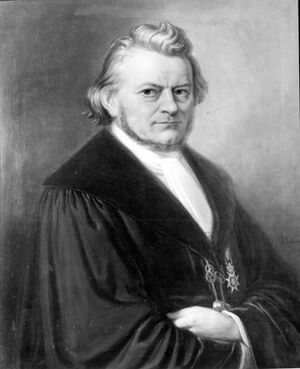Immanuel Hermann Fichte facts for kids
Quick facts for kids
Immanuel Hermann Fichte
|
|
|---|---|

Portrait of Fichte, 1859
|
|
| Born | 18 July 1796 |
| Died | 8 August 1879 (aged 83) |
| Alma mater | University of Berlin |
| Era | 19th-century philosophy |
| Region | Western philosophy |
| School | German idealism Speculative theism |
| Institutions | University of Bonn (1836–1842) University of Tübingen (1842–1863) |
| Academic advisors | J. G. Fichte (his father) |
| Notable students | Christian Hermann Weisse (epistolary correspondent) |
|
Main interests
|
Metaphysics, ethics, philosophy of religion |
|
Notable ideas
|
Concrete theism |
|
Influences
|
|
|
Influenced
|
|
Immanuel Hermann Fichte (born July 18, 1796 – died August 8, 1879) was an important German philosopher. He was the son of another famous philosopher, Johann Gottlieb Fichte. Immanuel Hermann Fichte believed strongly in theism, which means he believed in a personal God. He often disagreed with the ideas of the Hegelian School, another group of philosophers at the time.
Contents
His Life Story
Immanuel Hermann Fichte was born in a town called Jena. From a young age, he was very interested in philosophy. He was especially drawn to the ideas of his father, which he felt were based on the idea of God.
Education and Early Career
Fichte studied at the University of Berlin and graduated in 1818. Soon after, he began teaching philosophy there. He also attended lectures by Georg Wilhelm Friedrich Hegel, another very influential philosopher. However, Fichte didn't agree with Hegel's ideas, especially what he saw as Hegel's belief that God was everything and not a separate, personal being.
Because of some disagreements with the authorities about his views, Fichte left Berlin in 1822. He became a professor at a school called a gymnasium in Saarbrücken. Later, in 1826, he moved to Düsseldorf for a similar teaching role.
Becoming a University Professor
In 1836, Fichte became a professor of philosophy at the University of Bonn. He was very popular and successful as a lecturer there. But he wasn't happy with the way the government was controlling education in Prussia. So, in 1842, he moved to the University of Tübingen, where he became a full professor. He taught many different philosophy subjects until he retired in 1875. After retiring, he moved to Stuttgart, where he passed away in 1879.
Founding a Philosophy Journal
In 1837, Fichte started a journal called Zeitschrift für Philosophie und speculative Theologie. A journal is like a magazine where scholars publish their ideas. He edited this journal to share his philosophical views, especially about the philosophy of religion. He worked with other philosophers like Christian Hermann Weisse, who also believed in a personal God. Fichte thought that Hegel's ideas, while clever, were fundamentally wrong.
Fichte's own philosophical ideas changed quite a bit over the years. Some people felt his views were a mix of different ideas, but he always tried to bring different philosophical systems together.
His Philosophical Ideas
Fichte's main goal in his philosophy was to explain how God could be a real, personal being. He called his theory "concrete theism."
Concrete Theism and God's Personality
Fichte tried to combine different philosophical ideas, like monism (the idea that everything is one) and individualism (the idea that individuals are most important). He used ideas from Gottfried Leibniz's monadism, which suggests the world is made of many tiny, independent "monads" or units.
He disagreed with Hegelianism because he felt it made God seem less personal and didn't value human personality enough. Fichte believed that God should not be seen as an abstract "Absolute" (something without limits or parts) but as an Infinite Person. This Infinite Person, Fichte said, wants to see Himself reflected in finite (limited) human persons. He believed that humans are loved by God, and God arranges the world for their benefit.
Moral Experience and Christianity
Fichte thought that a good philosophy should explain our moral experiences. He valued philosophers who focused on morality, like Krause and Schleiermacher.
Fichte also believed that Christianity could be renewed. He thought it should become a strong, guiding force in society and the government, rather than just focusing on saving individuals.
Works
Immanuel Hermann Fichte wrote many books and articles during his life. Here are some of his important works:
- De philosophiae novae Platonicae origine (1818)
- Sätze zur Vorschule der Theologie (1826)
- Beiträge zur Charakteristik der neueren Philosophie (1829)
- Johann Gottlieb Fichtes Leben und literarischer Briefwechsel (1830–31) - This was about his father's life and letters.
- Grundzüge zum Systeme der Philosophie (1833–1846) - A three-volume work on his philosophy system.
- System der Ethik (1850–53) - A two-volume work on ethics.
- Anthropologie, Die Lehre von der menschlichen Seele (1856) - About the human soul.
- Psychologie. Die Lehre vom bewussten Geiste des Menschen (1864–73) - About the conscious mind.
He also edited the complete writings and letters of his father. Some of his works were translated into English.

